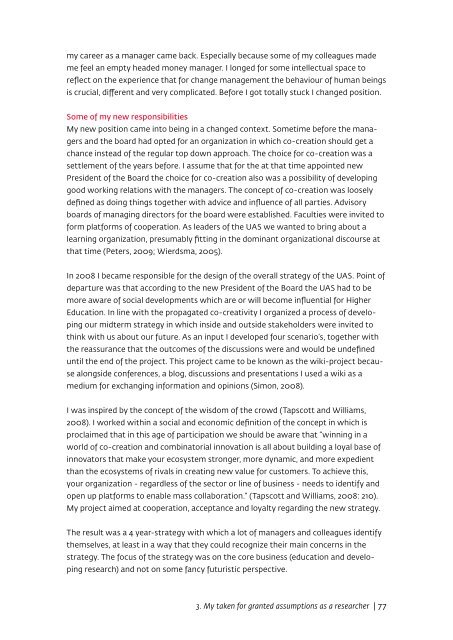Rumbling on performativity_Frits Simon
Rumbling on performativity_Frits Simon
Rumbling on performativity_Frits Simon
Create successful ePaper yourself
Turn your PDF publications into a flip-book with our unique Google optimized e-Paper software.
my career as a manager came back. Especially because some of my colleagues made<br />
me feel an empty headed m<strong>on</strong>ey manager. I l<strong>on</strong>ged for some intellectual space to<br />
reflect <strong>on</strong> the experience that for change management the behaviour of human beings<br />
is crucial, different and very complicated. Before I got totally stuck I changed positi<strong>on</strong>.<br />
Some of my new resp<strong>on</strong>sibilities<br />
My new positi<strong>on</strong> came into being in a changed c<strong>on</strong>text. Sometime before the managers<br />
and the board had opted for an organizati<strong>on</strong> in which co-creati<strong>on</strong> should get a<br />
chance instead of the regular top down approach. The choice for co-creati<strong>on</strong> was a<br />
settlement of the years before. I assume that for the at that time appointed new<br />
President of the Board the choice for co-creati<strong>on</strong> also was a possibility of developing<br />
good working relati<strong>on</strong>s with the managers. The c<strong>on</strong>cept of co-creati<strong>on</strong> was loosely<br />
defined as doing things together with advice and influence of all parties. Advisory<br />
boards of managing directors for the board were established. Faculties were invited to<br />
form platforms of cooperati<strong>on</strong>. As leaders of the UAS we wanted to bring about a<br />
learning organizati<strong>on</strong>, presumably fitting in the dominant organizati<strong>on</strong>al discourse at<br />
that time (Peters, 2009; Wierdsma, 2005).<br />
In 2008 I became resp<strong>on</strong>sible for the design of the overall strategy of the UAS. Point of<br />
departure was that according to the new President of the Board the UAS had to be<br />
more aware of social developments which are or will become influential for Higher<br />
Educati<strong>on</strong>. In line with the propagated co-creativity I organized a process of developing<br />
our midterm strategy in which inside and outside stakeholders were invited to<br />
think with us about our future. As an input I developed four scenario’s, together with<br />
the reassurance that the outcomes of the discussi<strong>on</strong>s were and would be undefined<br />
until the end of the project. This project came to be known as the wiki-project because<br />
al<strong>on</strong>gside c<strong>on</strong>ferences, a blog, discussi<strong>on</strong>s and presentati<strong>on</strong>s I used a wiki as a<br />
medium for exchanging informati<strong>on</strong> and opini<strong>on</strong>s (Sim<strong>on</strong>, 2008).<br />
I was inspired by the c<strong>on</strong>cept of the wisdom of the crowd (Tapscott and Williams,<br />
2008). I worked within a social and ec<strong>on</strong>omic definiti<strong>on</strong> of the c<strong>on</strong>cept in which is<br />
proclaimed that in this age of participati<strong>on</strong> we should be aware that “winning in a<br />
world of co-creati<strong>on</strong> and combinatorial innovati<strong>on</strong> is all about building a loyal base of<br />
innovators that make your ecosystem str<strong>on</strong>ger, more dynamic, and more expedient<br />
than the ecosystems of rivals in creating new value for customers. To achieve this,<br />
your organizati<strong>on</strong> - regardless of the sector or line of business - needs to identify and<br />
open up platforms to enable mass collaborati<strong>on</strong>.” (Tapscott and Williams, 2008: 210).<br />
My project aimed at cooperati<strong>on</strong>, acceptance and loyalty regarding the new strategy.<br />
The result was a 4 year-strategy with which a lot of managers and colleagues identify<br />
themselves, at least in a way that they could recognize their main c<strong>on</strong>cerns in the<br />
strategy. The focus of the strategy was <strong>on</strong> the core business (educati<strong>on</strong> and developing<br />
research) and not <strong>on</strong> some fancy futuristic perspective.<br />
3. My taken for granted assumpti<strong>on</strong>s as a researcher | 77



